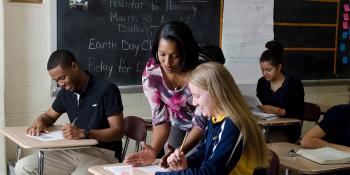
Teacher of the Year inspires through community service
Like many teachers, Jahana Hayes encourages her students to do community service. It can look a little different at her high school, though. Students without enough to eat, for example, collect groceries for the local food bank. Those who live in rundown apartments or in shelters build new homes with Habitat for Humanity families.
“I know how desperate the need can be, but I also know from my own life how good it feels to help someone else,” says Hayes, who teaches history at John F. Kennedy High School in Waterbury, Connecticut. Noting her emphasis on community service and her work developing a service-learning curriculum, the Council of Chief State School Officers announced Hayes as the 2016 National Teacher of the Year.
“I tell my students, ‘No matter how bad your situation is, there is still room to give,” Hayes says. “And where you are right now is not where you have to end up. It is just a stop in your journey.”
And they believe her, too, because of her own journey. Hayes grew up in a housing project, surrounded by drugs and violence, in the neighborhood where she now teaches. After becoming a teenage mom in high school, she put college on hold, almost for good. “I always had a grit about me, and I always worked hard,” she says. “But there was a point where I thought college wasn’t going to happen for me. I thought, ‘I have messed this up too bad.’”
Hayes doesn’t believe that college is necessarily the path for every student, but it was the one she needed to take to become a teacher. She found that path little by little, step by step, she says, first enrolling in a community college, then a four-year school. Ultimately, Hayes became the first in her family to graduate from college. And incidentally, that child she had in high school, the one she brought with her to class and the library, grew up to be a teacher, too. She has three other children, including a 7-year-old, whom she calls the boss of the family.
Hayes says her life experience has made her a more empathetic teacher. She was raised by a grandmother who didn’t drive and couldn’t make it to parents’ night. “I remember being ashamed of that for so many years,” Hayes says. So she now holds telephone conferences with parents who can’t make it to school functions because they are working, or don’t have car, or can’t drive like her grandmother. “Something as simple as that is huge for some families,” she says.
Community service is another way of leveling the playing field for students from different backgrounds and financial situations, Hayes says. “So often, kids compare themselves to everyone around them. They compare grades and test scores. When they go out into the community and do service, everyone is exactly the same.”
“The experience of building with Habitat becomes about leadership and working together and teambuilding, things we teach in school that come to life on the Habitat worksite.”— Jahana Hayes, 2016 Teacher of the Year
Hayes’ students do neighborhood cleanups and raise money for cancer and autism research. They lead coat and food drives. For the past decade, they have volunteered with Habitat. “I’ve seen kids who have sat beside each other in the same class year after year, then become friends on the worksite,” Hayes says. “The experience of building with Habitat becomes about leadership and working together and teambuilding, things we teach in school that come to life on the Habitat worksite.”
Kennedy students started out building with Greater Waterbury Habitat in their hometown. Over the years, they have raised money and traveled to work on Habitat homes in New Orleans, Louisiana, and Charleston, South Carolina. In April, they went to Dallas, Texas. “We started traveling after we found out that many of our students had never been out of the state or on an airplane,” Hayes says. “We really try to make the trips a service project and a cultural learning experience.”
Hayes remembers one student who signed on to volunteer with Habitat. He listed his address as the local shelter. “He said, ‘You don’t know what it means for me to be a part of this project. I know eventually my family will have a place to live. In the meantime, I can help make it better for someone else.’”
While students learn a lot from serving the community, Hayes says, community service makes them better students. They research their service projects and devise strategies to tackle them. “A lot of my kids were not getting good grades and were beginning to disengage from school. When I started to take them out in the community to do service, they came back different. They wanted to stay at school and talk about things,” Hayes says. Students also are required to write about their projects. “I get more writing out of these types of activities than I ever did in the classroom.”
Hayes is currently working on developing a curriculum where students can earn credit for community service. “We have focused on standards and test scores and accountability, which is all very important,” she says. “We also have an obligation to graduate people who care about other people and are willing to help other people.”
Subscribe to our monthly newsletter
Get the latest Habitat news, volunteer opportunities, DIY tips and more ways to get involved.